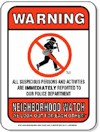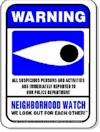HomeCrime PreventionStaying Safe at Home
Staying Safe at Home
Burglars usually stay away from homes that have lots of light and sound coming from them. Burglars look for 3 basic things when choosing their target. They look for:
- An empty house
- An easy way in
- A way to hide or conceal their activities
Here are some ways to do that.
Doors and Windows
- Put locks on all doors and windows and USE them all the time. (You don’t want to confront a burglar and a burglar doesn’t want to confront you. Don’t let anyone surprise you in your own home.)
- Exterior doors should be metal or solid 1-3/4" hardwood.
- Always re-key or replace all locks when first moving in, even if it’s newly constructed.
- Secure sliding glass doors with commercially available bars or locks, or place a wooden dowel or broomstick in door track.
- Secure window air conditioners to prevent removal from the outside.
- Don’t hide a key outside--if you can find it, so can someone else. Instead leave an extra key with a trusted friend or relative.
- Determine who is at the door BEFORE you open it. Use a peep hole, or speak to the person through a closed & locked door--door chains can be broken.
- NEVER open door to strangers. If there is an "emergency", offer to make a call for them. Do not let them in your house.
- Teach children NEVER to answer door, but to come and get you if they hear someone at the door. Install door latches above their reach to be sure.
Lights, Visibility, Access
- Exterior Lighting - all possible entrances should be well lighted.
- Install outdoor lighting with motion detectors and/or light sensors.
- Trim any bushes or trees that hide doors or windows.
- Keep curtains and window shades closed at night.
- Use automatic timers for lights, radios, and anything that makes your home look occupied.
- Keep ladders, tools, toys, and recreational equipment inside when you’re not using them.
- Be sure all newspapers, mail, and packages are picked up daily (especially check entrances you rarely use).
- Do not put your name on mail box.
- Landscape with plants that discourage easy access to your windows (thorny type plants).
Telephone Access
- Have Unlisted telephone number, or just initials in directory without address listed.
- Never give credit card, bank account numbers, or social security number over the telephone, unless you initiated the call, and NEVER give this type of information over a cordless or cell phone. They can easily be monitored.
- A 1998 Law for tele-marketers prohibits them from making "Anonymous" sales calls.
- Basic Rule about telemarketing and telephone solicitors is "If it sounds too good to be true, it is too good to be true."
-
Ask for a financial report if the caller requests a donation for a charity. Reputable charities will always send this information if you ask.
Since September 1998, telephone solicitors that use live callers, or automatic dial announcing, are now required to provide on all Caller I.D. units their company’s name and a working call-back; telephone number. Companies that do not provide this information can be fined $1,000 a day. If a telemarketer calls you without providing the company’s name and a working incoming call-back number on your Caller I.D. unit, try to get enough information about the company to file a complaint with the Public Utility Commission.
Public Utility Commission
Office of Consumer Protection
P.O. Box 13326
Austin, TX 78711
1-888-782-8477
Fax: 512-936-7003
e-mail: customer@puc.state.tx.us
Neighborhood Watch


- Get to know your neighbors. Watch out for each other.
- Don’t be afraid to report any suspicious activity or persons in your neighborhood. Get description of vehicle, person and report that information to police/sheriff fast, so they can act fast.
-
Start Neighborhood
Watch Programs
Organize an initial meeting, set goals, plan strategy, post signs, meet on a regular basis, plan and execute special "team" building projects like a Neighborhood Clean-up day, neighborhood barbecues and block parties, sport/game/hobby clubs. (Home Owners Associations good place to start with this effort)
If nothing in place, start with just your block, or part of the street--get organized and active and then work to make it grow.
Ask local law enforcement to attend your organizational meeting. - The key to keeping a Neighborhood Watch group active is maintaining interest over time. By getting everyone involved you will create a feeling of pride and the atmosphere of a small town neighborhood, even if you live in the city.
- Contact the National Neighborhood Watch Institute for more information on forming your own Neighborhood Watch Program and to order signs, decals, etc.
- Art Signs & Decals--a Southeast Texas business that makes the Neighborhood Watch signs, (409) 832-4333
- Knowing your neighbors is the best defense against crime. Be familiar with each others comings and goings, family make-up, vehicles they drive, work hours, planned vacations or visitors, and scheduled deliveries or repairs.
Prepare for the Worst
- Place inventory list, photos, and videos in safe deposit box at your bank.
-
Record all serial numbers on
inventory, engrave your Texas Drivers License on all possible
items. (TX-12345678) DO NOT use Social Security
Numbers
(If your possessions are stolen, your TDL engraved on something and/or the serial numbers may be the only way to prove to law enforcement that the possessions really do belong to you, so you can recover them.)
- Make a copy of EVERYTHING in your wallet, and update that copy every time something is added or deleted.
-
Do not keep information in your vehicle
listing your home address, or home telephone number. Do not
leave house keys in your vehicle.
(Someone breaking into your car will get a lot more if you have your home information and keys inside the vehicle.)